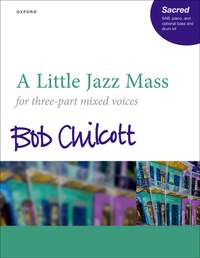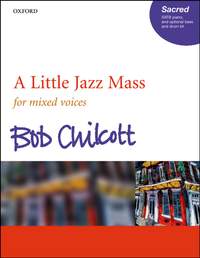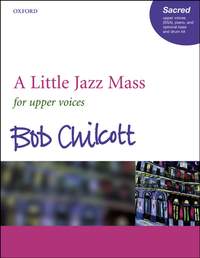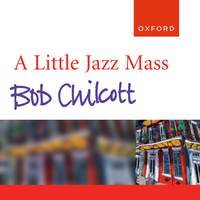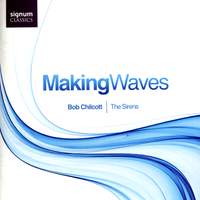Interview,
Bob Chilcott: 20 Years of A Little Jazz Mass
His music has been widely recorded by leading British choirs and groups including The King’s Singers, King’s College Cambridge, Wells Cathedral, Westminster Abbey, The Sixteen, Tenebrae, The BBC Singers, The Bach Choir, Commotio, and Ora.
This year we celebrate the twentieth anniversary of Bob Chilcott's iconic A Little Jazz Mass. We spoke with the composer about writing the piece for its premiere in New Orleans, the reception it has received over the past twenty years, and his thoughts on combining jazz and sacred music.
Bob Chilcott Sheet Music Bob Chilcott Recordings A Little Jazz Mass
A Little Jazz Mass was originally premiered in the St Louis Cathedral in New Orleans for the 2004 Crescent City Choral Festival. What was that like, having the premiere in the birthplace of jazz?
Oh, it was great! I’ve been going to a festival there since 1999, and I offered to write the piece as a kind of joke really. We used to do the concerts in the Cathedral, and it is a wonderful venue. Everything has to be sacred of course, so I said I'd do a jazz mass. I said I was going to call it ‘the big easy mass’ because New Orleans is also known as ‘the big easy ‘– but that's not a very polite way of talking about New Orleans, so I didn’t do that! I thought the idea was good though so I wrote A Little Jazz Mass. The premiere was a long time ago now, in 2004, twenty years ago. I'm going there next summer to do a twentieth-anniversary event. We've got a lot of singers already, so I'm pleased about that.
The piece has received an incredibly positive response over the last twenty years. How has the success of A Little Jazz Mass affected your career?
Well, it was a bit of a surprise to me that it grabbed people’s attention. That was great. OUP [Oxford University Press] started doing promotional CDs in 2005. I used to (and I still do occasionally) conduct the choir, and John Rutter produced them. We recorded A Little Jazz Mass on the very first CD in 2005. The head of promotion suggested at the time that I write a mixed voice version, which we used in the recording, and it was really well done. I think people liked it, which I was happy and quite surprised about.
I've got a friend who's a very fine jazz pianist, who has had an incredible career, and he’s played A Little Jazz Mass a lot. He gets booked to play in cathedrals like St Paul’s, St. Alban’s, and Lincoln, and it's been used liturgically, which surprised me. I went to one performance in Salisbury Cathedral where they did it with organ, bass and drums. And I initially thought, “Oh no!”, but it was great! Even the priest said how great it was, so I was happy about that!
Do you have any standout memories from the last twenty years that have stuck with you, such as a particular recording or performance of the piece?
Well, lots of them actually. I did a concert in Carnegie Hall with around 250 kids who were very, very good, as well as very good jazz players. The players just thought the kids were fantastic, you know? And of course, all the kids wanted to play the instruments, and be the players!
I also performed it during a jazz festival in Japan, and we had this amazing pianist who also ran the festival. The players were once again wonderful, but when we did the first rehearsal, we started it, and the pianist didn't play at all. It was just the bass and drums playing with the choir. I was a bit worried that I had upset him! We did it all the way through and then the interpreter said, “he wants to do it again” and it was then that I realised that he had no music. He was doing it all by ear, and I thought, “Wonderful, that's a musician for you!” It was a great performance. I also did a twentieth-anniversary performance in Japan, just this May. I love the juxtaposition of really, really good players and the choir.
Oxford University Press recently published an SAB version of the piece. How does that differ from the other versions, and why is it important to make the work available for more choral combinations twenty years on?
I'm really pleased with the way it worked out. We did the first performance in Italy in the summer with a choir in Milan, and it was great. I'm doing another performance in a couple of weeks in Barcelona. And for that we've said you can sing whatever parts you want. If you've learnt it with an upper voice choir you can do it that way, or you can do it with mixed voices, or SAB. They all work together.
What inspired you to compose the piece? Were there any jazz musicians or styles in particular which influenced you?
I used to be an arranger for Radio 2 in the 1980s and I did quite a lot for the BBC Radio Orchestra there. I've always loved jazz, and I was quite well-schooled in it, so it was something I felt very comfortable with. I used to go to a lot of concerts and because of the sort of musician he was, Dave Brubeck at that time was still quite a strong influence.
He did a sacred piece with a jazz ensemble which I heard and loved. I thought the idea was good because it's this idea of combining different styles. I've always had a very open view of music; I like lots of different types of music. You just hope that someone will say “I didn't think that I was going to like it, but I have to admit, I rather did”. I like that attitude rather than narrow lines of music - I'm not interested in that.
You have since gone on to compose a variety of other jazz-inspired works – can you tell me a little bit about those?
I wrote another jazz mass called the Nidaros Jazz Mass. I wrote that for a very good girls’ choir in Norway. I wasn’t sure whether I would write another jazz mass, but I gave it a go, and I like that it turned out a bit different from A Little Jazz Mass.
A few years later, for the same festival, I wrote the Samba Mass. We had a little samba band, I love samba. I've been to Brazil and have tried dancing the samba. I'm really bad at it, (northern hips!) but I loved the freedom of it. I try to kind of emulate that in my writing.
I used to do a festival in Oregon for youths, and one of the most exciting things I did for that was to write some pieces for a Shakespeare anniversary called Ophelia, Caliban and Miranda. I wrote it for choir and a group from Los Angeles called the Yellowjackets, who are just a knockout. That was a thrill, I loved doing that.
Do you think you will write more jazz-inspired works?
I would. Often for me, the thrill is in getting the right players. I'd like to write something with a bigger ensemble than a trio, but it would have to be carefully thought about. I did a festival once with several songs by Sting arranged by a Swedish jazz musician with a big band and a huge choir. The choir had to all be miked up because the band was so loud, so there are always balance issues to consider. In a funny sort of way though I feel a bit more at home when I am doing that type of music.
How do you ensure that your music is singable and communicative? Is accessibility of repertoire something you are conscious of when you are composing?
Yeah, definitely. For me, I’m just interested in making contact with people. I’m that type of person. I'm not interested in anything other than people saying, “I like singing this.” I think to a certain extent, you have to find devices that will draw people in, something to help them to perform it. And I think it's the same with players. I love what I do, and want other people to love it too, particularly if they're younger; that is more of a challenge nowadays. So yes, I think about accessibility all the time. It's all to do with the ideas you have, the words, and the things that connect with people. It's really important.
How has your work as a choral conductor affected the way you compose music for choir?

I don't want to conduct pieces that don’t engage the choir. When I do my choir in Birmingham, I pick the repertoire carefully and select as big a mix as possible to give people different stylistic pieces. If they’re giving up that time every week, they've got to come and enjoy it. We did the first rehearsal last week and they said, “Oh we really like the pieces you've chosen”. I thought that’s great, I hope that they are still saying that in three weeks’ time!
I think that it is important because nowadays people vote with their feet. A lot of choirs will put on pieces that people are not interested in, and then audiences don’t turn up. And that's just the way it is. You’ve got to draw them in.
Could you take us on a journey through the movements of A Little Jazz Mass?
The Kyrie is fairly upbeat. I remember being criticised because in the Kyrie you are asking God to have mercy on you, and they thought it sounded a bit too positive. But I like the vibe in it, it is quite funky and is a bit 60s in its style.
The Gloria is also quite upbeat. It has a fast-walking bass. I tried to write it in a kind of big band style, and then there's a middle section when the text gets more reflective, and the music is much slower with quite a heavy beat. There is no Credo in it. It's a shortened Mass, so it has got the Sanctus which is built on a simple chord sequence and is quite simple to sing, quite harmonic and slow.
The Benedictus is very similar to the Kyrie. It has a similar rhythm but slightly different harmony; the harmonic pattern is different.
The Agnus Dei is quite impassioned. I love the text; from a liturgical point of view, it is very powerful. I think even if you're not a Believer, it's got something in it which connects on a human level. I absolutely love it. A choir from a music school in Germany did a recording of it and they wanted to extend it with certain sections of instrumental music, with a girl doing some doo-wop. I really enjoyed that, so when I did it in Japan recently, I did that too and extended quite a lot of it.
Were those improvised sections with the jazz musicians?
Yes – we had fantastic players, so it was an opportunity for them too. As far as I'm concerned, if people want to do it like that, it’s absolutely fine!
What's next for you?
I've just written a set of songs for Oxford High School for their 150th anniversary. It's with upper voices and orchestra and the texts are written by girls from the school, which is fantastic. I am also writing quite a large mass setting with lots of interpolated texts about peace for the Three Choirs Festival in Hereford. That's going to be premiered at the end of July, and we've got an American Premiere in Dallas in the following January. I'm excited about that. We have a wonderful soloist, the mezzo-soprano, Helen Charlston. Really, out of this world. That will be with brass, organ and timpani. I've got to get home and write that, it is quite a big piece, so I’ve got to get my socks on!
The energy for doing something new hasn't gone away. We just have to try and keep choral music alive and keep good ideas coming.
Sheet Music and Recordings
For SAB and piano, with optional bass and drum kit.
Available Format: Sheet Music
For SATB, piano, and optional bass and drum kit
Available Format: Sheet Music
for SSA, piano, and optional bass and drumkit
Available Format: Sheet Music
Recording of A Little Jazz Mass with Bob Chilcott and The Oxford Choir.
Available Formats: MP3, FLAC/ALAC/WAV
A collection of songs and arrangements by Bob Chilcott, performed by a specially assembled group of singers and jazz musicians.
Available Formats: CD, MP3, FLAC/ALAC/WAV, Hi-Res FLAC/ALAC/WAV




